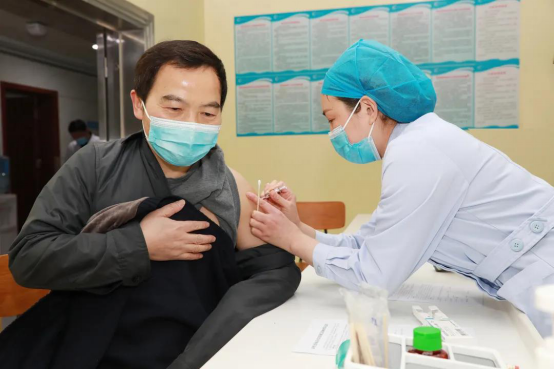In the past few days, the first batch of vaccine injections preventing COVID-19 virus free of charge has been launched in various parts of Hunan. In accordance with the Xiangtan Center for Disease Control and Prevention's vaccination work arrangement, Xiangtan Central Hospital started the vaccine jabs for its employees from January 6.
The hospital leaders attached great importance to the injection work. Zeng Jianping, Vice Chairman of the Xiangtan CPPCC and President of the Hospital, and Xia Hong, Secretary of the Party Committee of the Hospital, made overall arrangements and meticulous planning to ensure the smooth progress of employee vaccine jabs. At 3:30 in the afternoon on the day, Zeng Jianping came to vaccine injection clinic located on the first floor of Building 3 and was the first person to complete the injection. He took practical actions to encourage employees to actively take the vaccine and establish a healthy barrier to prevent COVID-19.
 |
It is reported that the 500 vaccines allocated by the Hospital this time have all been stored in the warehouse and are supplied for 250 medical staff. The vaccine name is SARS-Cov-2 Vaccine, which was approved for marketing on December 31, 2020. Each subject must first make an appointment in the Department of General Medicine, and then go through information verification, informed consent, vaccine jab, observation, etc. to complete the entire vaccination process. As of 5 pm on the day, a total of 37 people completed the first dose of the vaccine, and no adverse reactions were reported.
Here below are some details for your reference if you want to take the vaccine
Question: How many shots of the vaccine?
Answer: The recommended immunization program is 2 injections with at least 14 days between them. The recommended vaccination site is the deltoid muscle of the upper arm. Arbitrary adjustment of immunization program may affect safety, immune response effect and immune durability.
Question: What are the benefits of taking the vaccine?
Answer: Among the high-risk exposure groups who received emergency vaccine in China, more than 60,000 people went to high-risk areas abroad, and the risk and severity of infection of those who were vaccinated were lower than those who had not been vaccinated. It suggests that the vaccine has potential clinical application value.
Question: How long can antibodies last after being vaccinated?
Answer: The virus was discovered in less than a year, so it is too early to draw a conclusion on how long the vaccine can protect us. The latest evidence suggests that according to WHO regulations, the protection period of the vaccine is more than half a year, and there is basically no problem.
Question: What are the possible adverse reactions to the vaccine?
Answer: Symptoms for adverse reactions typically include: headache and fever, local redness, or lumps, and some people have cough, loss of appetite, vomiting, and diarrhea.
Question: What to do if there is an adverse reaction?
Answer: After the vaccine injection is completed, the subject should stay at the vaccine site for 30 minutes before leaving. If symptoms related to adverse reactions occurred after returning home, the subject should report to the medical staff and seek medical attention if necessary.
Question: Who is not suitable for the vaccine?
Answer: Pregnant women, breastfeeding women, people who are in the acute phase of fever, infection and other diseases, and people suffering from immunodeficiency or immune disorders, as well as severe liver and kidney diseases, drug-uncontrollable hypertension, diabetes complications, malignant diseases, and tumor.
People who are not in the 18-59 age range should wait for further clinical trial data disclosure to determine whether they can be vaccinated in the future.
Question: Are SARS-Cov-2 Vaccine and other vaccines co-existable?
Answer: It is not recommended to vaccinate simultaneously with other vaccines.
Question: After receiving the vaccine, do I need to continue to wear masks?
Answer: So far, the protective effect of any vaccine has not reached 100%, and a small number of people may still not able to prevent disease and get infected after vaccination. At present, herd immunity has not been established.
Therefore, after vaccination, personal protective measures such as wearing masks, washing hands frequently, opening windows for ventilation, and maintaining social distance are still required.
Question: Do I still need a nucleic acid test after receiving the vaccine? Can I replace the nucleic acid test report with the vaccination certificate?
Answer: Vaccination can reduce the risk of infection to a certain extent, but the protective effect of any vaccine cannot reach 100%. If necessary, it should still cooperate with relevant departments to carry out nucleic acid testing.